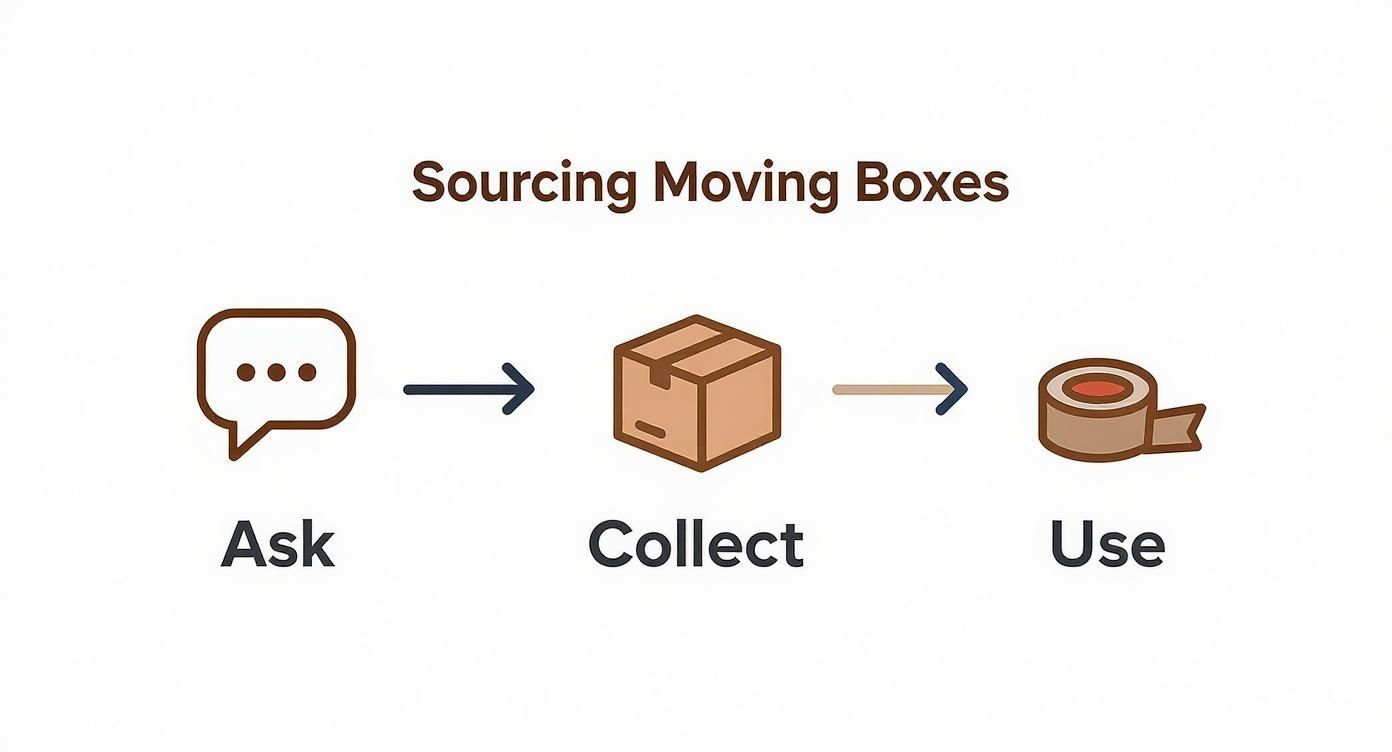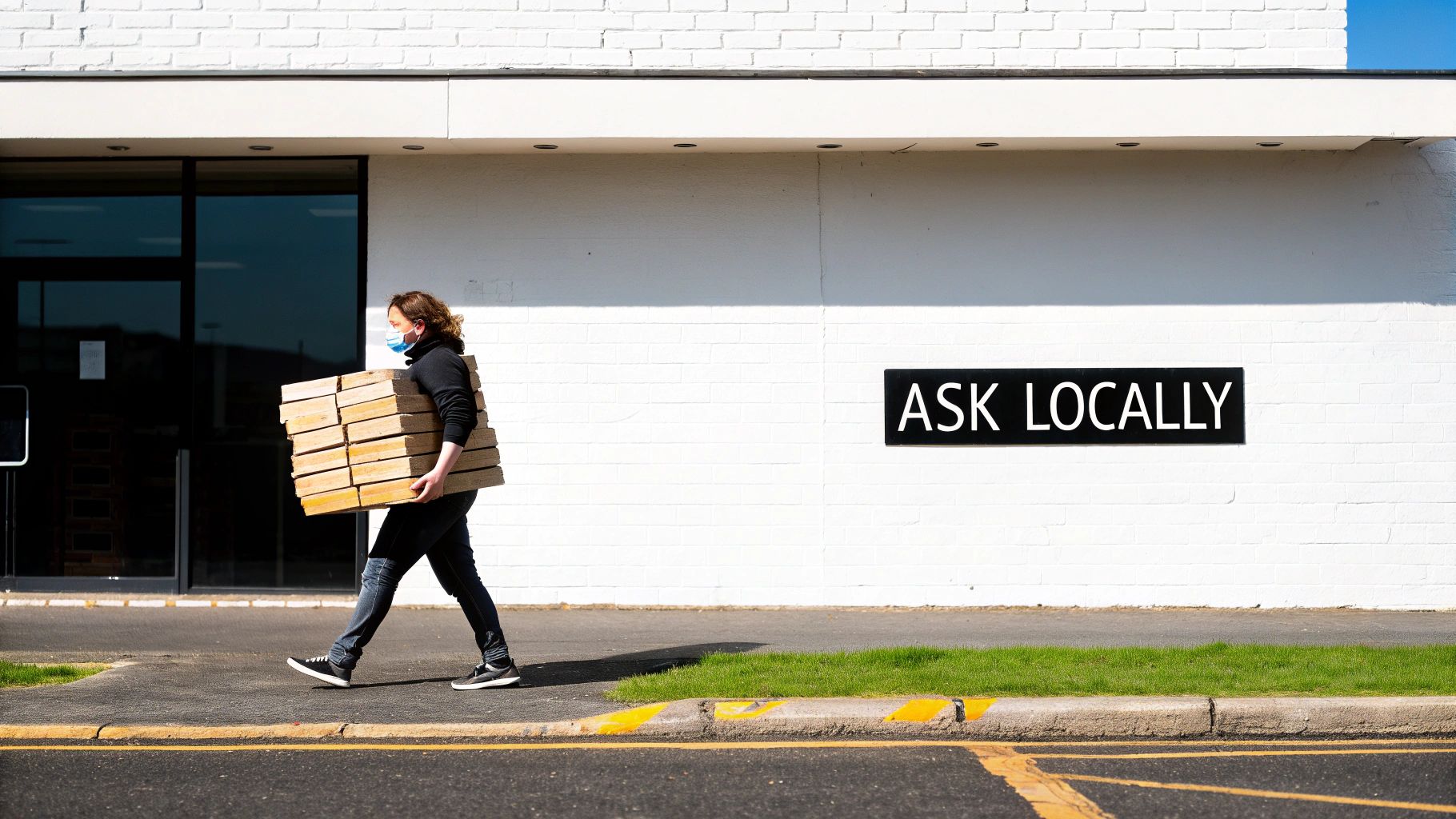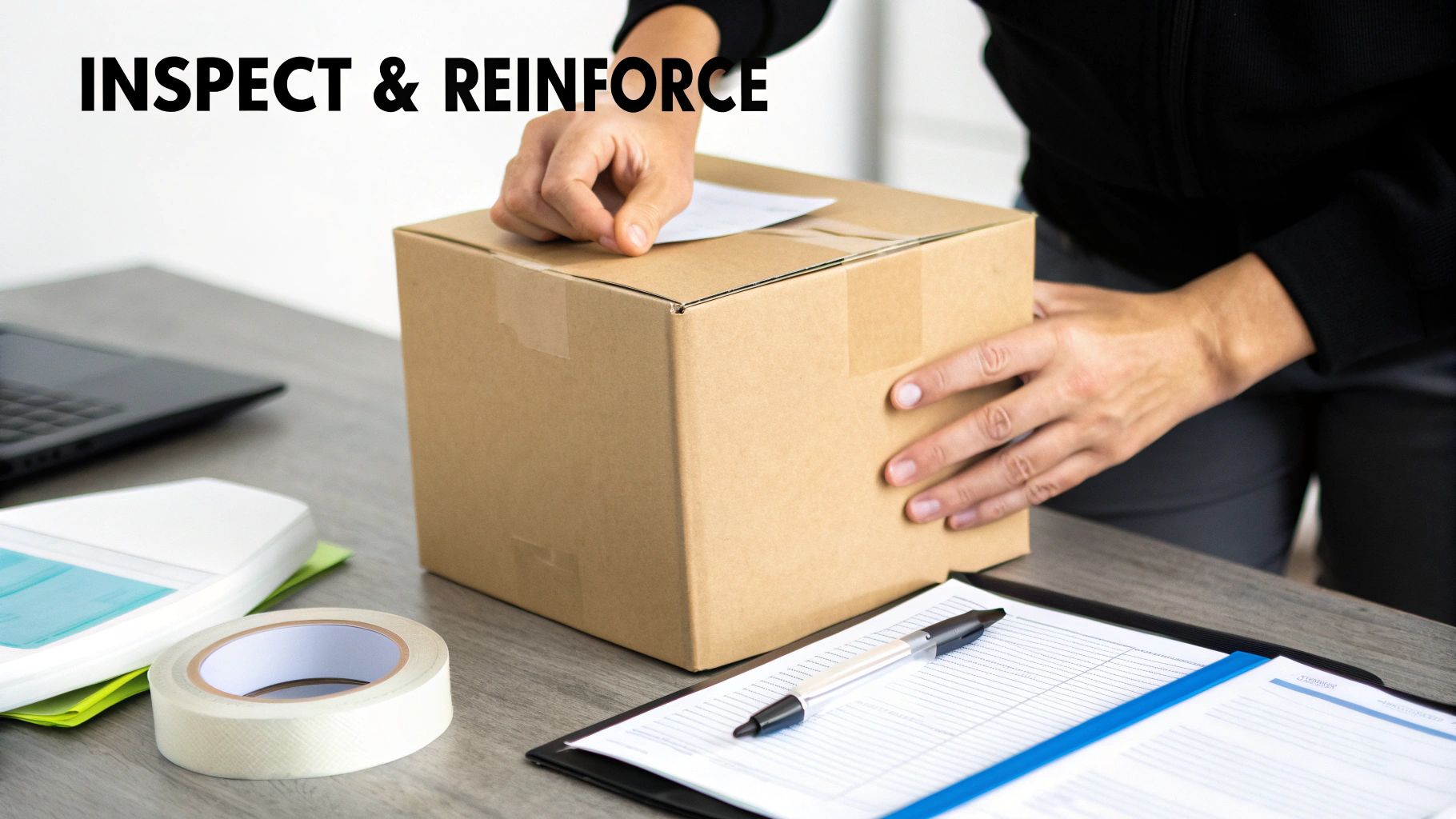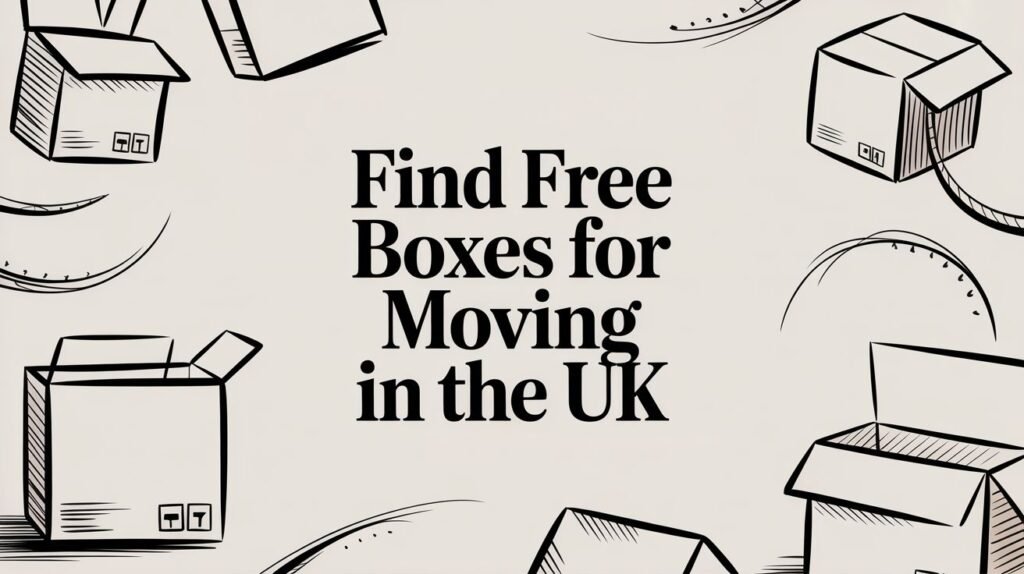Finding free boxes for moving is one of the easiest wins when you’re trying to save a bit of cash and move more sustainably. Honestly, the best places are often just around the corner – local shops, online community groups, and even neighbours who've just moved. With a little forward planning, you can easily gather all the sturdy cardboard you need without spending a penny.
Your Guide to Sourcing Free Moving Boxes
Moving house in Bristol or Bath can certainly add up, but your packing materials don't have to contribute to the bill. Sourcing free boxes isn't just a thrifty move; it’s an eco-friendly choice that cuts down on waste and taps into the local sharing economy. Before you head out to buy new, it’s always worth exploring the free options available right on your doorstep.
Think of this as your game plan for finding, collecting, and prepping used boxes for the big day. We'll cover everything from the most reliable local spots to the best way to eyeball a box for quality, making sure your belongings are packed safely and securely.
Where to Look First
Here in the UK, grabbing free moving boxes from local sources is a tried-and-tested method for anyone gearing up for a move. Big supermarkets like Tesco, Morrisons, and Asda get deliveries all the time in strong cardboard boxes. More often than not, a polite ask with a member of staff is all it takes to get a stack for free.
Don't overlook the smaller places, either. Independent shops, off-licences, and even takeaways often have piles of perfectly good boxes heading for the recycling bin that they’re happy for you to take off their hands.
To give you a head start, here’s a quick rundown of the best places I've found for sourcing free boxes, with a rough idea of how reliable they are and the quality you can expect.
Top Local Sources for Free Moving Boxes
| Source Location | Best For | Reliability Score (1-5) | Typical Quality |
|---|---|---|---|
| Large Supermarkets (Asda, Tesco) | Sturdy, uniform boxes for kitchen items | 4 | Good to Excellent |
| Independent Shops & Off-Licences | Small, strong boxes for books/heavy items | 3 | Good |
| Online (Facebook, Freecycle) | All types, including specialty boxes | 5 | Varies – inspect carefully |
| Office Buildings | A4 paper boxes, great for files & books | 3 | Excellent |
As you can see, a proactive approach really pays off. A well-timed request can easily land you dozens of high-quality boxes.

The process is simple: just ask and then arrange a collection.
Pro Tip: Timing is everything. I've had the best luck visiting shops on weekday mornings. That's usually after they’ve unpacked deliveries but before they’ve had a chance to flatten all the boxes for recycling.
Keeping everything organised is crucial when you're in the middle of a move. To make sure you stay on track while gathering your materials, grab our free moving checklist for 2025 for a complete step-by-step timeline.
Right, let's talk about finding free boxes. Forget scrolling for hours online – your best bet is usually just around the corner. Finding good, free boxes locally is all about a bit of smart timing, a friendly smile, and knowing the best spots to look.
Honestly, the simple act of asking is your secret weapon here. It turns what feels like a massive chore into a bit of a local treasure hunt.
Most shops get deliveries daily or weekly, which means they’re constantly dealing with a mountain of good, sturdy cardboard. The trick is to get to them after they've unpacked but before everything gets flattened for recycling. A quick, polite chat with the manager or a staff member can often land you a car boot full of quality boxes, saving you a fair bit of cash.
How to Ask Without Being Awkward
I get it, walking into a busy shop and asking for a handout can feel a bit strange. But you'd be surprised how many managers are actually glad to get rid of boxes they have to deal with anyway. It all comes down to how you approach it.
Keep it quick, friendly, and to the point. Something like this usually works a treat:
"Hi there, I'm moving house just down the road and was wondering if you had any spare cardboard boxes from a delivery? I'd be happy to take them off your hands."
It's polite, it explains what you need, and you’re framing it as you doing them a favour. Phoning ahead is a great tactic too, especially with the bigger supermarkets. Just ask when their main delivery days are and what time would be best to pop in and collect.
The Best Places to Hunt for Boxes in Bristol and Bath
The big chains are a good start, but don't ignore the smaller independent shops. If you take a walk down Bristol's Gloucester Road or through Bath's city centre, you're surrounded by brilliant sources.
Here are a few places that are often goldmines:
- Supermarkets: Big stores like Sainsbury's or Lidl are brilliant for finding strong, consistently sized boxes, especially the ones that held tins or jars. Try going mid-morning on a weekday, right after they've restocked the shelves.
- Off-Licences and Pubs: These are fantastic for seriously tough boxes designed to carry heavy glass bottles. They tend to be smaller, which makes them perfect for packing up books, records, or kitchen stuff.
- Bookshops and Chemists: Everyone knows book boxes are built to last. Chemists are another surprisingly good source; they get frequent deliveries in small, sturdy boxes that are ideal for protecting fragile items.
- Offices and Schools: Think beyond retail. Office buildings are always getting rid of high-quality printer paper boxes – they’re a great uniform size and even come with lids. Schools, particularly around the end of term, can be another excellent source.
By looking past the obvious spots, you can find a steady stream of free boxes for moving. All it really takes is a quick stroll around your local area and a friendly attitude. Just one last tip: always give the boxes a once-over to make sure they're clean, dry, and show no signs of pests before you bring them home.
Using Online Communities for Your Box Hunt
Your next stash of moving boxes might be just a few clicks away. In Bristol and Bath, people are constantly moving, and digital platforms are a goldmine for connecting with those who have just finished their move and are desperate to get rid of a mountain of cardboard. It's a brilliant bit of local recycling.

The trick is knowing where to look and how to ask. Places like Facebook Marketplace, Gumtree, and Freecycle are always buzzing with activity. Honestly, most people who've just unpacked are so keen to clear the clutter they'll happily give their boxes away for free to the first person who can collect them.
Mastering Your Digital Search
To make your online hunt for free boxes for moving a success, you need to be a bit strategic. Just scrolling through listings when you remember isn't going to cut it; you need to be proactive to snap up the good stuff.
Here are a few tactics that I've seen work time and again:
- Set Up Alerts: This is a game-changer. On Gumtree and Facebook Marketplace, you can save your search for "free moving boxes" or "cardboard boxes" and get a notification the second a new listing goes live. It’s the best way to be first in the queue.
- Craft a "Wanted" Post: Don't just wait for people to offer. Pop a friendly post on local community groups explaining you're moving house and would be incredibly grateful for any spare boxes. A bit of politeness can work wonders.
- Be Specific but Flexible: It helps to mention what you’re after (e.g., "sturdy boxes for books" or "a few larger ones for duvets"), but make it clear you're happy to take a mixed bunch. It shows you're easy-going and not a fussy collector.
Before you dive in, it’s a good idea to know roughly how many boxes you’re looking for. To avoid hoarding a thousand boxes or ending up short, a great first step is using a removal packaging calculator for an estimate tailored to your home.
Arranging a Safe and Smooth Collection
So you’ve found a promising source – brilliant! Now for the pickup. The golden rule here is to make it as painless as possible for the person giving the boxes away. Be quick with your replies and try to be flexible with collection times. They’re doing you a favour, after all.
A quick word on safety: when you arrange to collect boxes, always put your safety first. If you can, suggest meeting in a public place. If you're collecting from a private home, just be sure to let a friend or family member know where you're going and when you should be back.
Being a considerate community member really pays off. A simple "thank you" message after you've collected the boxes is a lovely touch and keeps the goodwill flowing. By using this digital-first approach, you can often source all the boxes you need without ever leaving your sofa—until collection day, of course.
How to Inspect and Prepare Your Free Boxes
Getting your hands on free boxes is a great start, but remember: not all boxes are created equal. Just because it's free doesn't mean it’s up to the job of protecting your stuff. A quick, savvy inspection on the spot is what separates a useful find from a pile of junk you'll just have to recycle later.
First things first, check the box’s strength. Does it feel rigid and sturdy, or a bit soft and flimsy? For anything heavy like books, kitchen gadgets, or crockery, you really want to find double-walled cardboard if you can. Run your hands over the corners and seams – they should be solid, with no big rips or tears that could split open when you lift it.
Next, trust your eyes and nose. Any dark, crinkly-looking stains are a massive red flag for water damage, which completely zaps the strength out of cardboard. And don't be shy – give it a quick sniff. A musty, damp smell could mean mould or mildew, and you definitely don't want that getting into your bedding or clothes.
Your On-the-Spot Box Checklist
Before you start filling your car, give each potential box a quick once-over. This mental checklist takes seconds but can save you a world of pain later on.
- Is it dry? Dampness is the ultimate box-killer. If it feels even slightly moist, leave it.
- Is it clean? Steer clear of anything with oily patches, weird stains, or leftover food bits. You don't want to accidentally bring pests home.
- Is it strong? The cardboard should feel firm and hold its original shape without sagging.
- Are the flaps intact? Make sure all the top and bottom flaps are there and aren’t ripped off at the folds.
This isn't about grabbing every box in sight; it's about being selective and only taking the ones that will actually do the job properly.
Getting Your Boxes Ready for Action
Once you've got your chosen boxes back home, a little bit of prep work goes a long way. Even the cleanest-looking boxes can have a surprising amount of dust or warehouse grime hiding inside. I usually give them a quick wipe with a dry cloth or hit them with the brush attachment on the vacuum.
With your boxes all clean, the final step is to make them bomb-proof. This is where good quality packing tape is your best friend. Seal the bottom securely using what’s known as the 'H-tape' method: run a strip of tape right down the middle seam, and then add another strip along each of the shorter edges. This creates a really strong base that won’t give way, even with a heavy load.
It's a good idea to have a rough number in mind. The average UK house move uses about 60 boxes, though you might only need 15 to 25 for a one-bedroom flat. Knowing your target helps you know when to stop hunting! For a bit more help, you can find a great guide for estimating box numbers on helpusmove.co.uk.
Smart Packing and When to Look at Other Options
You’ve managed to gather a mountain of free boxes, which is a fantastic start. But now for the real challenge: actually packing them. Working with used boxes from all over the place is a bit different from using a neat stack of brand-new ones. It’s all about making them work for you while keeping your stuff safe.

First things first: think about weight. It’s a classic mistake to grab a huge box and stuff it full of books or your entire collection of tinned goods. That’s a recipe for a disaster when the bottom inevitably gives out. A good rule of thumb I always follow is to pack heavy things in small boxes. No single box should ever feel like a deadlift to move.
When it comes to breakables, you'll need to get creative with padding. Free boxes don't come with fancy inserts, so raid your linen cupboard. Towels, tea towels, bedding, and even clothes are perfect for cushioning glassware and ornaments. Make sure you wrap each item on its own, then pack them snugly together, filling any empty spaces to stop things rattling around.
Knowing When a Free Box Isn't Enough
As brilliant as they are, free boxes have their limits. You need to be realistic, especially when it comes to your most treasured or heaviest items. A box that used to hold packets of crisps just isn't built to handle a set of dumbbells or your vintage hi-fi system.
Putting those kinds of things in a second-hand box is a real gamble. You don’t know its history—has it been sitting in a damp stockroom? Has it already been pushed to its limits on a previous journey? The few quid you save aren't worth the heartbreak of a box collapsing and destroying something irreplaceable.
My Two Cents: I always recommend a hybrid approach. Use all the free boxes you can find for things like clothes, bedding, and kitchen utensils. But for the really fragile or valuable stuff, it’s worth spending a little on a few purpose-built, new boxes.
This way, you get the cost savings of freebies without risking your most precious cargo. Once you have your boxes sorted, don't forget that things like reliable packaging tape are non-negotiable for reinforcing those seams and making sure everything stays sealed tight.
Sensible Alternatives Worth Considering
Let's be honest, sometimes the whole process of finding, checking, and taping up old boxes is more trouble than it's worth. If you’re short on time or moving a large family home, it might be time to look at other options.
Renting heavy-duty plastic moving crates is a popular choice around Bristol and Bath. Companies will drop them off at your door and pick them up when you're done. They’re incredibly tough, waterproof, and stack perfectly, offering far better protection. It’s a really convenient, zero-waste solution.
The other smart move is to simply buy a few high-quality, specialised boxes. Things like wardrobe boxes with a hanging rail or dedicated dish-pack boxes are game-changers. They can save you a ton of time and give you peace of mind that your best gear is properly protected. If you want to see what’s out there, have a look at our guide to the best packing materials for moving house to find the right fit for your move.
A Few Final Questions About Free Moving Boxes

Even with the best plan in hand, a few practical questions almost always come up when you're on the hunt for free boxes for moving. It’s only natural. We’ve pulled together the most common things people ask us here in Bristol and Bath to give you some quick, no-nonsense answers.
This should help iron out any last-minute wrinkles in your plan, so you can get on with the packing.
How Many Free Boxes Do I Actually Need?
Honestly, this is more of an art than a science. The right number depends entirely on how long you’ve lived somewhere and, well, how much stuff you’ve accumulated! But having a rough target helps you avoid collecting a mountain of cardboard or, far worse, running out on the final day.
Here’s a general rule of thumb I’ve found holds true:
- 1-Bedroom Flat: You’ll probably want to aim for 20-30 boxes.
- 3-Bedroom House: This is a bigger job, likely needing 50-70 boxes.
A little tip from experience: always overestimate. If you’re sourcing freebies, it’s always better to grab a few extra than you think you’ll need. It’s far less stressful than a mad dash for more boxes at the last minute. You can always pass the spares on to another mover via Freecycle.
Are Boxes From Food Shops Safe to Use?
This is a great question, and the answer is a definite "it depends". You have to be a bit picky. Any box that's been used for fresh produce like bananas or, worse, raw meat, is an absolute no-go for packing your bedding or clothes. They can hold moisture, bacteria, and smells you really don’t want near your belongings.
What you should look for are boxes that held dry, pre-packaged goods. Think tins, cereals, crisps, biscuits, or bottled drinks. These are almost always clean and sturdy. Just give any box a quick visual check and a sniff test before taking it. If in doubt, leave it behind or save it for packing things from the shed.
What’s the Best Way to Get Rid of Boxes Afterwards?
Once you’re finally unpacked, you'll be staring at a fortress of cardboard. The easiest thing to do is flatten them for recycling, and that's fine. But there’s a much better, more community-minded option: pass them on.
The simplest way is to put a quick post on Facebook Marketplace or your local Freecycle group. Something like "Free moving boxes – collection from BS5" is all it takes. You'll be amazed how quickly someone else in the middle of their own moving chaos will bite your hand off for them. It keeps good boxes in circulation and helps out a neighbour.
Should I Mix Free Boxes with Purchased Ones?
Yes, absolutely! In fact, this is what I’d recommend to most people. It’s the smartest way to balance saving a bit of cash with keeping your belongings truly safe.
Here’s the strategy I'd use:
- Use Free Boxes For: The tough, non-fragile stuff. They are absolutely perfect for books, clothes, bedding, kids' toys, and most of your kitchen pots and pans.
- Buy New Boxes For: Anything fragile or valuable. It’s well worth spending a few quid on brand-new, purpose-built boxes for your glassware, dishes, computer, TV, and any sentimental items you’d be gutted to lose.
This hybrid approach gives your most precious items the protection they deserve while keeping your moving budget in check.
If sourcing, checking, and preparing boxes feels like one job too many, the team at SimplyPro Removal & Storage Ltd can take care of everything. We offer a full professional packing service using high-quality materials to make sure every last item gets to your new home in one piece. Get your free, no-obligation quote today!


